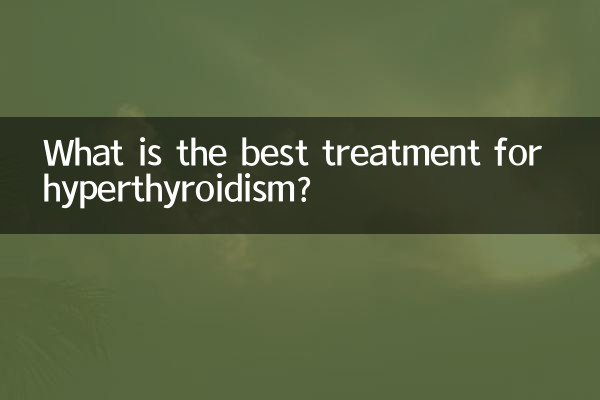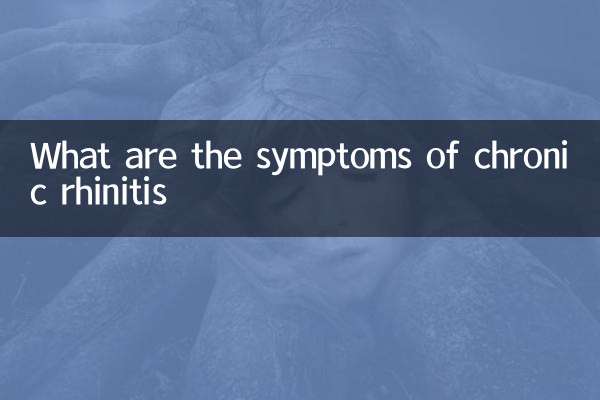What is the best treatment for hyperthyroidism?
Hyperthyroidism (hyperthyroidism) is a common endocrine disease, mainly characterized by excessive secretion of thyroid hormones, leading to symptoms such as hypermetabolism, increased heart rate, and weight loss. There are many treatments for hyperthyroidism, including medication, radioactive iodine therapy, and surgery. This article will combine the hot topics and hot content in the past 10 days to provide you with a detailed analysis of the best treatment plan for hyperthyroidism.
1. Comparison of treatment methods for hyperthyroidism

| Treatment | Applicable people | Course of treatment | advantage | shortcoming |
|---|---|---|---|---|
| drug treatment | Patients with mild to moderate hyperthyroidism, pregnant women, children | 1-2 years | Non-invasive and reversible | Long course of treatment and high recurrence rate |
| radioactive iodine therapy | Patients with moderate to severe hyperthyroidism and those who are ineffective in drug treatment | single or multiple times | Remarkable curative effect and short treatment course | May cause hypothyroidism and require radiation protection |
| surgical treatment | Those with obvious thyroid enlargement and suspected malignant lesions | Disposable | Complete cure, quick results | Risks of surgery, possible damage to parathyroid glands |
2. Hot topics in the past 10 days: New developments in the treatment of hyperthyroidism
1.Optimization of drug therapy: Recent research shows that combining an antithyroid drug (such as methimazole) with a beta blocker (such as propranolol) can control symptoms more quickly and reduce side effects.
2.Controversy over radioactive iodine therapy: Some experts have suggested that radioactive iodine treatment may lead to an increased risk of long-term hypothyroidism and suggest that young patients choose carefully.
3.Advances in surgical techniques: Minimally invasive thyroid surgery (such as laparoscopic surgery) has shown the advantages of less trauma and faster recovery in recent clinical applications, and has become a hot topic of discussion.
3. How to choose the best treatment plan?
Based on recent clinical data and expert recommendations, the selection of treatment options for hyperthyroidism should comprehensively consider the following factors:
| factor | Recommended plan |
|---|---|
| age | Young patients give priority to drug therapy; elderly patients may consider radioactive iodine therapy |
| severity of illness | Mild to moderate: drug treatment; severe: radioactive iodine or surgery |
| Thyroid size | Surgery is recommended for patients with significant swelling |
| Comorbidities | Beta blockers should be used with caution in patients with heart disease |
4. Hot issues of concern to patients
1.Can hyperthyroidism be cured?: Radioactive iodine and surgical treatment can radically cure hyperthyroidism, but may lead to hypothyroidism; drug treatment has a higher recurrence rate.
2.How to eat during hyperthyroidism treatment?: Recent nutrition research suggests that patients with hyperthyroidism should avoid high-iodine foods (such as kelp, seaweed) and consume more high-protein and high-calorie foods.
3.Effects of hyperthyroidism on fertility: The latest guidelines point out that normal pregnancy can be achieved after hyperthyroidism is under stable control, but thyroid function needs to be closely monitored during pregnancy.
5. Summary
The best treatment plan for hyperthyroidism varies from person to person, and a personalized plan needs to be developed based on the patient's specific situation. Medical treatment is suitable for most patients with mild to moderate symptoms. Radioactive iodine treatment is effective but needs to be weighed against the risk of hypothyroidism. Surgical treatment is suitable for patients with goiter or suspected malignant transformation. It is recommended that patients choose the most suitable treatment method under the guidance of a professional doctor.
Recent hot topics also show that long-term management of hyperthyroidism (such as regular review and lifestyle adjustments) is crucial to the prognosis. No matter which treatment method is chosen, patients should maintain good medical compliance and follow up regularly to ensure treatment effectiveness and safety.

check the details

check the details